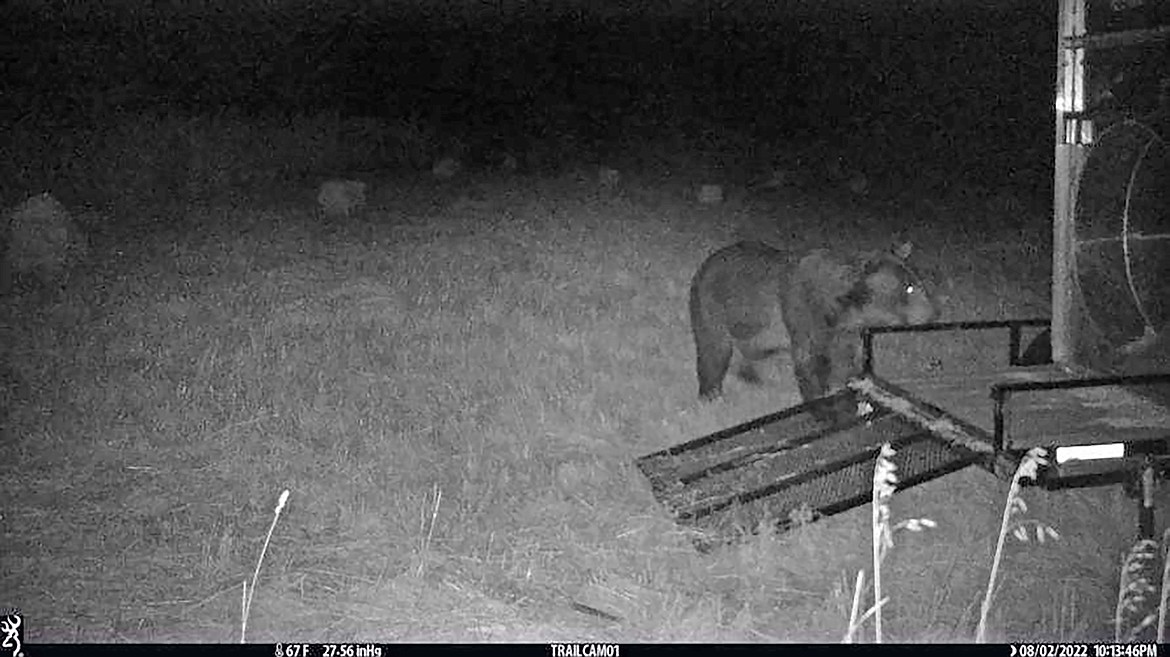Grizzly euthanized in Porthill after repeated attacks on livestock
PORTHILL — On Aug. 4, after repeated attacks against livestock in north Boundary County a large adult grizzly bear has been euthanized.
There has been a series of livestock losses due to grizzly bears this spring and summer across Boundary County.
Fish and Game received a report on Aug. 2, four sheep that had been attacked and killed and two additional sheep that had been injured near Porthill, T.J. Ross, Regional Communications Manager for IFG wrote in a press release. Upon further investigation by Fish and Game Conservation Officers and Wildlife Services, it was confirmed the bear was a grizzly.
Traps to capture the bear were set on the evening of Aug. 2. Although the bear returned to the area, it did not enter the trap, but it did kill an additional sheep that night, Aug. 3. The traps remained set and all additional livestock were corralled in a temporary electric fence to try and prevent additional livestock loss, Ross wrote.
The bear once again returned overnight on Aug. 3 and was successfully trapped.
Due to the bear’s repeated behaviors of killing livestock within close proximity of a home, the bear was euthanized after it was captured, Ross wrote. The decision was made with consideration for the safety of people and property.
Conservation Officer Nate Gattey with F&G told the Bonners Ferry Herald that it is not known if the bear was the same one in the incidents in Good Grief, due to not having identifying information from that incident.
He said that the euthanized bear had trained itself to eat livestock and the concern was that it would continue to do so.
“[At Porthill,] the bear came multiple times and seemed to be targeting livestock,” Gattey said.
He added that prior to the incident, the livestock were not behind an electric fence.
“Electric fences are one of the best things to have in order to keep out predators,” he said. “If we can make it hard for bears to eat livestock then they will go elsewhere.”
Grizzly bears in Idaho are federally protected under the Endangered Species Act, so any management action is done in consultation and cooperation with the U.S. Fish and Wildlife Service.
Bears are quick learners
Bears learn behaviors quickly, especially related to gaining access to easy food sources. The series of grizzly bear and livestock encounters in North Idaho this spring and summer is a reminder of that.
In response to the incidents over the past few months, Fish and Game is reminding livestock owners and outdoor recreationists of a few important tips to promote safety for both people and livestock.
If you own livestock or property:
Electric fences are the most effective deterrent for grizzly bears. If you have livestock, secure them overnight in a barn, or corral them in an electrified fence.
Properly dispose of attractants, including trash, animal carcasses, compost, livestock feed and beehives.
Securely store food, garbage and other attractants in a bear-resistant place.
Keep pet food secured as you do your own. Bears like pet food as much as your pet does.
Avoid filling bird feeders until wintertime.
Do not bury or throw garbage into the nearby woods.
Make sure to clean your grills and keep them in a building, if possible.
If you are recreating in bear country:
Carry bear spray and know how to use it.
Don’t hike alone, if possible.
Look for bear sign or recent activity (tracks, scat, torn up logs and stumps)
While hiking, make plenty of noise to avoid surprising a bear.
Never approach bears, always stay at least 300 feet away.
Do not interrupt bear activities.
Never feed bears.
Never run if you encounter a bear.
Know the difference between a defensive encounter and a predatory encounter and how to respond in each situation. Check out this helpful video for details.
We are here to help
Two Fish and Game employees are largely dedicated to grizzly bear management and education in the Panhandle Region. The first is a grizzly bear enforcement and education senior conservation officerGrizzly Bear Enforcement and Education Senior Conservation Officer, and the second is a seasonal Grizzly Bear Management and Education Biologist.
The positions exist to respond to grizzly bear-human conflicts, work with landowners to prevent future bear conflicts and provide bear education and outreach. Both positions are based out of Boundary County, and as part of their program, supplies and support can be provided to the public for grizzly bear-human conflicts.
Landowners can request assistance and a variety of educational materials for “living in bear country” by contacting the Panhandle Regional office at (208) 769-1414. We encourage the public to take advantage of the resources we have available to help. In addition, other cost-sharing programs through other entities exist for reducing human-bear conflicts.
For more information or if you have questions, please contact the Panhandle Regional office.
You can also follow the Panhandle Region Facebook page to get regular news and updates.

